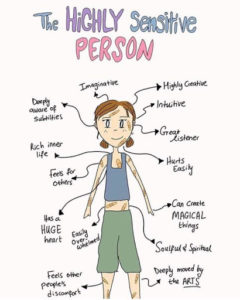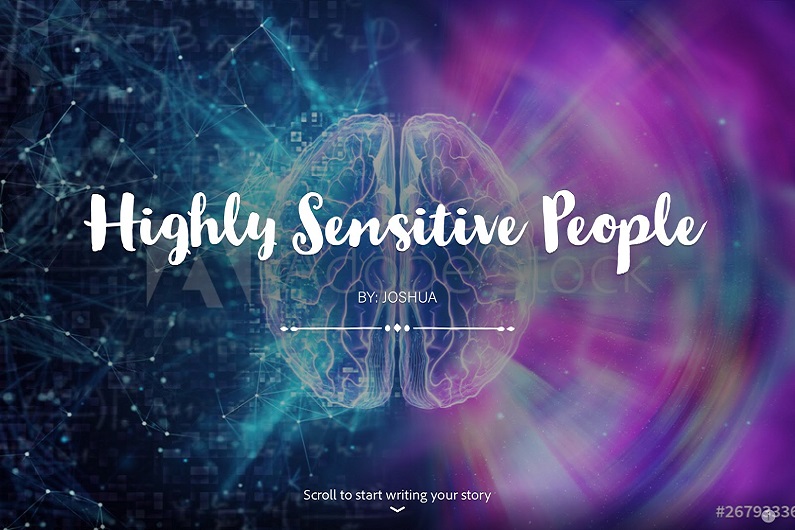A Resource Written by a Highly Sensitive Child
The following guide comes from an 11-year old highly sensitive child, Joshua Harper Rautenbach, with permission to publish from his parents. Joshua reached out to me from Singapore for a school research project in which he set out to understand his own sensitivity as a superpower. In our communication, we discovered there are many resources for parents and teachers of highly sensitive children, but there are very few resources specifically for highly sensitive children and we didn’t find any written by a highly sensitive child. Thus, Joshua has offered his report as perhaps the first guide on being HSP written by a highly sensitive child.

Introduction to Highly Sensitive People
Many people wonder what an HSP is? Why did they even think up a name for this particular personality trait? HSP is a personality trait that is found in 15 to 20 percent of all the people in the world. This has been proven by Dr. Elaine Aron, a clinical psychologist who created the term “highly sensitive” in her 1996 book The Highly Sensitive Person. Often people will possibly say to an HSP “Why are you so sensitive?” or “Stop acting like a baby.” But do not listen to them! Some HSPs think that they are different from everyone else. It is okay to be different and in this report you will learn what an HSP is, the pros and cons of being HSP, the six different types of HSP, and finally how HSPs can turn their gifts into their very own superpower. Being an HSP does not make them strange, being an HSP actually makes them very special and unique!

Chart of how many HSPs are in the world
What is a Highly Sensitive Person (HSP)?
Highly Sensitive People or HSP for short, is a personality trait only found in 15 to 20 percent of the Earth’s population. HSP is not a disorder! High sensitivity, or sensory processing sensitivity (SPS) is actually an inherited genetic trait. Scientific testing through a functional MRI scan showed that HSPs are genetically more sensitive to intense negative and positive triggers. There is nothing wrong with them. In fact, being an HSP is a gift. HSPs just have a sensitive nervous system, which means that they are more sensitive to their surroundings. They process more information than average and think more deeply about things. But HSPs are often mistaken for being introverted and highly emotional people who can appear to be insecure, apprehensive and depressed.
It may have its downsides, but that does not mean it is all bad. HSPs also have heightened senses and are able to notice small details. They also have a very sensitive sense of smell and hearing. Their nervous system is a lot more evolved than others which means that they are more tuned in to their environment and others feelings. So what are the pros and cons of being an HSP?

Example of a HSP barrier
Pros & Cons of Being HSP
| Pros | Cons |
|
|
There are many pros and cons for being an HSP. This report will explain both.
5 Advantages of Being HSP
1) An HSP will always consider others needs and wants before their own because they can detect if others are feeling uncomfortable or distressed. Here is one example: If an HSP has a friend over for a play date, they will always consider that friend’s needs and wants above their own such as in what games to play or what movie to watch. HSPs are also very polite and well-mannered because they are mindful of not offending others.
2) HSPs are highly creative and imaginative individuals who are deeply moved by the arts and natural beauty. They see the world through a much bigger lens. Many artists, authors, songwriters and people in the performing arts are highly sensitive people.
3) HSPs are also very intuitive and perceptive individuals. They are able to read people very well and know when they are lying or being deceiving. They are also very good at noticing people’s body language and tone of voice. So, think twice before you tell a lie to an HSP!
4) Highly sensitive people are well-organised and extremely meticulous. They are very detail-orientated and always give their best.
5) HSPs make great team members because their understanding of the feelings of other team members make them considerate to everyone’s point of view.
5 Disadvantages of Being HSP
Now you know the pros. What about the cons?
1) The extreme sensitivity of HSPs can sometimes make their relationships strained and difficult because they can be easily hurt or angered. A harmless statement can become an insult. For example, you are just joking about your friend’s costume. You are just being funny but they might not know that and take offense.
2) The next con is that HSPs can often feel emotionally deprived and empty because of their constant need to care for and please others. People pleasing demands a lot of self-sacrifice. For example, when a friend is in a bad situation and they want you to do something. You may not want to do it, but you do anyway. This is because HSPs don’t want to let their friend down so they might do it even though they may not want to.
3) In addition, HSPs find it hard to make quick decisions. This is because they overthink every detail and take a lot longer to decide. For example, you are at dinner with your family and it is time to choose what you want to eat. You may choose very fast, but an HSP will take a lot longer.
4) HSPs are also prone to anxiety, depression, sleep disorders and lowered immunity. This can often lead to frequent coughs and colds.
5) Lastly, HSPs can quickly be overwhelmed if given too many tasks at one time or put under a lot of pressure at school. Tests and projects will often cause a lot of stress and anxiety.
So, these are the advantages and disadvantages of being an HSP. But guess what? There are many different types of Highly Sensitive People!

Example of Pros and Cons in the human mind
6 Different Types of HSP
Did you know that there are different types of HSP? Well, there are. Not all HSPs are the same and personality characteristics differ from person to person. Here are six different types.
1) Psychomotor. For these highly sensitive people, standing still is as challenging as climbing a mountain. Psychomotor HSPs experience an abundance of energy and enjoy intense physical activities. They can also be highly competitive and often exhibit nervous habitats such as biting their nails.
2) Sensual. These HSPs have extremely heightened senses often leading to be picky eaters. They are also at risk of becoming overstimulated very easily and need a lot of quiet time.
3) Intellectual. An intellectual HSP will ask a lot of questions and reflect on their thoughts deeply. They are very good at solving problems, recalling information and observing others carefully. This can lead them to be highly critical of others and themselves.
4) Imaginational. These HSPs have lots of notebooks filled with scribbles and drawings. They experience intense emotions and vivid dreams which can cause them to have difficulties in perceiving the differences between what is real and what is fake. They have a low tolerance for anything boring.
5) Orchid Child. According to professor Bruce Ellis, most children will survive or even thrive in whatever circumstances they encounter like a dandelion. But orchid children are more sensitive than dandelions. If brought up the right way, they will blossom into happy and productive adults. However, given the wrong circumstances they can be more susceptible to depression.
6) Emotional. All HSPs experience strong emotions, however for emotional HSPs, their emotions can become too intense and manifest in the physical such as sweaty hands, red face, increased heart rate, and upset stomach. They are extremely empathetic and are affected by the feelings and emotions of others. They also struggle to adapt to new surroundings. So how can HSPs turn their gifts into their very own superpower?
How HSPs Can Turn Their Gifts into Superpowers!
Being an HSP may have its disadvantages, but there are also many advantages to it as well. A way to refer to these advantages are superpowers. Yes, HSPs have superpowers! Not physical powers like the superheroes from Marvel or DC. They are more like mental powers.
HSPs are very empathetic. That means they feel for others strongly and can care very deeply for their well-being.
HSPs are very considerate. They are flexible thinkers, and acutely aware. That means HSPs most often notice very tiny details. This is why they pick up the feelings of those around them.
Highly sensitive people have vivid imaginations and respond more intensely to the world around them. This can make them some of the most creative people in the world. Many artists, inventors, authors, songwriters and actors are often highly sensitive people. Albert Einstein, Nicole Kidman, Katherine Hepburn, Martin Luther King, Jr., and even Steve Jobs are some famous personalities known as highly sensitive people.
Another superpower is that HSPs are sincere listeners. For example, they like to listen and talk less. It actually depends on the person. They can embrace life experiences, and finally they love deeply.

Characteristics of HSP
So, now you know about the personality trait called HSP. This report has gone over what an HSP is, the pros and cons about being an HSP, the six different types of HSP, and finally how HSPs can turn their gifts into their very own superpower. Remember, HSPs are not weird or strange; they are unique and possibly special! But an important thing to remember from this report is that to never judge a book by its cover, but by the wise words in it.

Bibliography
https://melissanoelrenzi.com/highly-sensitive-people-superpowers
Melissa Noel Renzi Aug 7, 2017
https://thedailyguru.com/being-highly-sensitive/
MARGARITA COACHING 2020
https://www.youtube.com/watch?v=TPR1P_D8zjY
Psych2Go YouTube channel May 17, 2020
https://www.brighterspacesuk.com/the-highly-sensitive-person/
David Wilson 6th Jun 2019
https://pixabay.com/photos/ad-announce-announcement-barrier-1238798/
Shutterbug75 Feb 18, 2016
https://www.youtube.com/watch?v=ys6zzEqHEg4
Psych2Go YouTube channel Oct 8, 2019
https://thedailymind.com/the-pros-and-cons-of-being-a-highly-sensitive-person/
The daily mind JANUARY 14, 2021
Glossary
- Psychologist: An expert in emotional and behavioral issues.
- Inherited: Genetically passed down from a family member.
- MRI: A machine that can scan brain waves even when the person is awake.
- Heightened: More intense than others.
- Perceptive/Intuitive: Notice tiny details.
- Meticulous: Similar to Detail-Orientated
- Detail-Orientated: People who are well organised and like to know where stuff is.
- Perceiving: Seeing the difference between things.
- Strained: Uneasy
- Vivid imagination: Forming distinct and striking mental images
If you are a highly sensitive child or are the parent of a highly sensitive child, you might read:
“7 Things Highly Sensitive Children Need to Know to Thrive”







